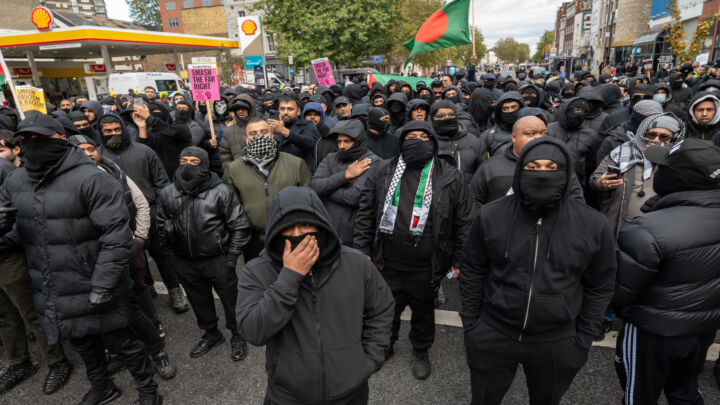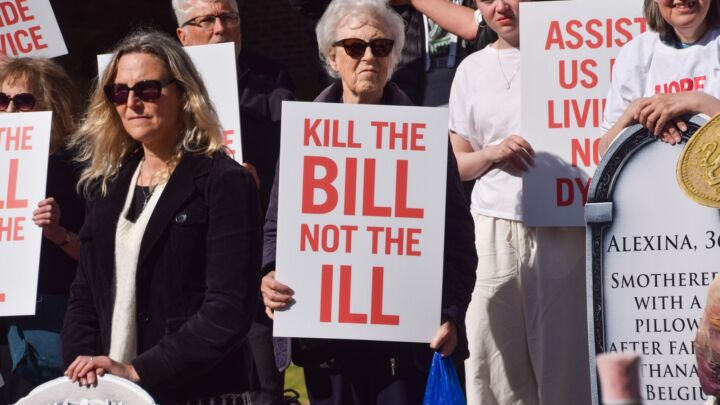Quelque chose pour Le Weekend
Sandwich’s French-themed festival highlighted those who embrace the modern world and those who do not.

Want unlimited, ad-free access? Become a spiked supporter.
Ask someone who follows current affairs or watches TV what mental images the word ‘France’ conjures up, and you’d probably get the following: economic stagnation, unemployment, the Front National, inter-ethnic strife, the most unpopular president in living memory, tax exiles in London, crime-riddled banlieues, the grim Paris as depicted in the police drama Spiral, and refugee camps in Calais. Judging by the media coverage, at least, France is the current ‘sick man of Europe’.
There is, of course, a wholly different France of popular imagination. This is the one incarnated in the annual, two day ‘Le Weekend’ French festival in Sandwich, on the east Kent coast. Here you will witness the jolly France of wine, croissants, sausages, berets, striped Breton shirts and the music of Edith Piaf – the France of good food, wine and song.
It’s a long time since French forces sacked Sandwich, back in 1457, and on this sunny Saturday there’s a spirit of cordiality as locals, visitors from Kent and those from across the Channel mingle in the heat and sun, the smell of fresh bread, roasted garlic and freshly baked croissants whifting through the air. On sale are biscuits, chocolate, crêpes (one stall promises a ‘Crepe In Your Face’), sweet garlic, mustard, cheese, spicy sausages and foie gras. This is France as its tourist board would have it, the one found in your Teach Yourself French books, the one you might remember from those Tricolore school textbooks of yore.
At the quayside there is an exhibition of vintage cars, featuring cutesy Citroen CV5s and that sleek, space-age French icon from the past, the Citroen CS23. The jet-black model on display here brings to mind the 1973 film, The Day of The Jackal. There’s an Edith Piaf tribute singer on King Street and a pleasant-sounding folk-blues-rock-bluegrass act called Les Troubadors de Paris, dressed up in Breton tops, red kerchiefs and berets. The group also features an accordionist. All that’s missing are strings of onions round their necks.
I meet two of the band members, Fiona (originally from Sheffield) and Antony. ‘Comment ça va?’, I introduce myself, timidly – receiving, unusually but happily, a response in French. I was sorely tempted to direct the ensuing exchange towards politics – I had rehearsed ‘Quel est votre avis de Marine Le Pen?’ – but since talking politics with strangers isn’t the done thing with strangers in Britain, why cause embarrassment with visitors from abroad?
Yet it was impossible not to have in mind the Front National’s recent victory in the European elections, or UKIP’s, considering we were in Kent. Only two days before, the East Kent Mercury led with a frontpage article speculating that Nigel Farage was going to stand for parliament in Sandwich itself.
The rise in Britain and France of populist, provincial Eurosceptic movements that are opposed to big government, mass immigration and, indeed, big business, which favours importing cheaper labour, seemed pertinent to Le Weekend. This event was steeped in nostalgia, appearing as a kind of collective effort to push back the tide of modernity – which is roughly what Front National and UKIP supporters also seek to do. To varying degrees, these parties have been described as ‘far right’, but I think a more accurate label would Poujadiste (even though I don’t believe UKIP has ever been tainted by accusations of anti-Semitism). No wonder Le Weekend is held in Sandwich, a dinky, prim medieval town where pubs, restaurants and chip shops are at great pains to describe themselves as ‘traditional’.
Still, it was a lovely day out. I managed to procure a recent copy of Le Figaro, and I sat myself down under a porch on Sunday, reading an article on the Ukraine crisis and looking the perfect perfumed ponce. I got chatting to Bill and Eileen, an elderly couple originally from Holborn, the subject matter inevitably turning to how horrible London has become these days (a ubiquitous gripe in these parts, among both native Kent folk and ex-Londoners). But otherwise it was a highly jovial affair, with the town bathed in sun and bedecked in bunting and flags as if it were VE Day or 6 June (rather than the day after). I had feared for anyone ambitious enough to attempt to replicate Edith Piaf’s uniquely shrill voice, but Jenny Lawford did a fine job, especially with renditions of ‘Pedam’ and ‘La Vie En Rose’.
Still, I couldn’t help thinking there was an element of fantasy about it all. On the train to Sandwich, I had read in The Times that a younger generation in France is turning its nose up at the traditional baguette, in favour of sliced bread, particularly a brand called Harry’s, owned by an Italian food group, Barilla. On sale at Le Weekend were Italian sweaters, Spanish ham and Rastafarian hats. Someone was wearing an Atlético Madrid top. As well as being fronted by a Yorkshire woman, one of Les Troubadors was called Tomislav. There were black, Indian and East Asian faces. An English folk band performed a rendition of ‘Fairy Tale of New York’, a composition about an Irishman getting drunk in America, originally sung by an Irishman born – as it happens – in Kent.
For better or for worse, not even such nostalgia-fests can evade the march of modernity, globalisation, multiculturalism and immigration. After all, towering above us was the onion dome of St Peter’s, a church built by Dutch and Flemish Protestant refugees from the Spanish Netherlands who fled here in the 1560s.
As Les Troubadors concluded the festival late on Sunday afternoon, I spotted someone taking a photograph with a digital camera designed to look like an old fashioned, analogue sort. This trompe l’oeil seemed fitting for a festival that felt like a simulacrum – or escapism from urban reality. But as elections demonstrate, a lot of people don’t like the direction the world is turning. In the end, what events like Le Weekend signify, possibly in France but certainly in Britain, is a growing divergence and increased antagonism between the outlooks, lifestyle and aspirations of those who live in the global metropolis and those who don’t.
Patrick West is a columnist for spiked.
£1 a month for 3 months
You’ve hit your monthly free article limit.
Support spiked and get unlimited access.
Support spiked – £1 a month for 3 months
spiked is funded by readers like you. Only 0.1% of regular readers currently support us. If just 1% did, we could grow our team and step up the fight for free speech and democracy.
Become a spiked supporter and enjoy unlimited, ad-free access, bonus content and exclusive events – while helping to keep independent journalism alive.
———————————————————————————————————————————–
Exclusive January offer: join today for £1 a month for 3 months. Then £5 a month, cancel anytime.
———————————————————————————————————————————–
Monthly support makes the biggest difference. Thank you.











Comments
Want to join the conversation?
Only spiked supporters and patrons, who donate regularly to us, can comment on our articles.